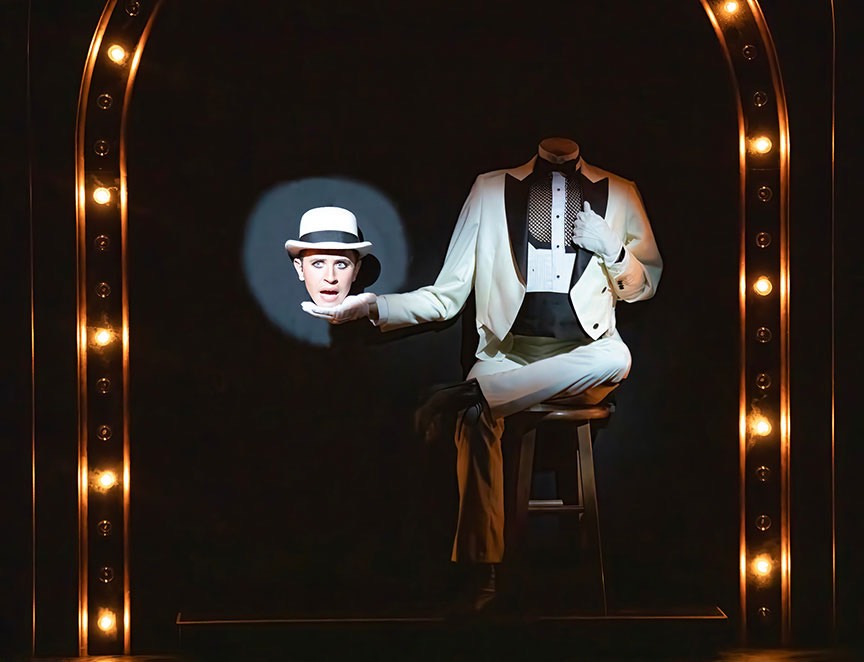
By Sandi Masori

SAN DIEGO — Cabaret has long been a musical theater staple, but somehow I had never seen it, not even the 1972 movie version starring Liza Minelli. In fact, all I knew of the show was the title song. Based on that song alone I thought the play would be a fun fluffy rom-com. Boy, was I wrong!
Those of you who have seen the show are probably sniggering into your coffee at my naïveté right now. The musical, mostly set in a Burlesque club, and packed with jaunty little numbers, is actually a pretty serious show about the fall of the Weimer republic in Germany as the Nazi’s come to power.
Playing now at The Old Globe Theater, the first half of the show is light and fun as I had expected. American aspiring novelist Cliff Bradshaw (Alan Chandler) travels to Germany for inspiration and meets Ernst Ludwig (Alex Gibson) on the train. It’s quickly established that Ludwig is smuggling something from France and when Bradshaw doesn’t seem bothered by this, the two strike up a friendship. Ludwig helps Bradshaw find lodging and also starts taking English lessons with him.
The inn is run by spinster Fraulein Schneider (Kelly Lester). Near the inn is the Kit-Lat Club, a nightclub with the kind of tawdry entertainment that so exemplified the golden age of Berlin — when taboos like cross-dressing, homosexuality, and the like were brought out of the closet and celebrated in artful fashion. Bradshaw catches the eye of English performer Sally Bowles (Joanna J. Jones), who after getting kicked out of club following an argument wheedles her way to staying with Bradshaw and they begin a fling.
Meanwhile, the first inkling that we get that something might be amiss is when Bradshaw meets the local fruit shop owner Herr Shultz (Bruce Sabath) who is courting Schneider. Upon learning that Bradshaw is American, Shultz asks him if he knows the Tenenbaums in New York. Now at this point, though we haven’t yet established any specific Jewish themes, any Jew who grew up in a Jewish community will recognize the attempt at Jewish geography. And knowing that it’s Berlin in 1931 the first sense of foreboding comes and is sealed when Shultz wishes Bradshaw mazel in the new year. At this point any Jew in the audience knows for certain that we have a member of the tribe represented onstage. For the non-Jews in the audience, it was explained that “mazel” is luck in Yiddish.
In case we’re not sure where this is going, Bradshaw explains to Bowles that he’s reading Hitler’s Mein Kampf to acquaint himself with the local politics. Bowles asserts that she doesn’t care about politics, and that it probably won’t affect them anyway. Why bother following all that nonsense?
Meanwhile, Bradshaw is unwittingly recruited to smuggle things into Germany by Ludwig to help a small political party. At this point alarm bells should be going off in the audience.
It all comes to a boil at the end of the first act, when at a party celebrating the engagement of Schultz and Schneider one of the inn’s resident ladies of the night tells Ludwig that Schultz can afford the party because the Jews have all the money anyway, thus bringing to his attention Schultz’ ethnicity. Ludwig then tells German Schneider that the wedding can’t happen as Schultz is not a German. We then see his Nazi armband and get where the play is going.
There was one part that made me feel uneasy, and I wasn’t sure if it aged well, the play having originated in 1966. That scene was in the second act where one of the nightclub songs seemed to compare Jewish women to pigs. Though I understand they were setting the scene to show how pervasive the Nazi philosophy was, it still made me feel a little weird and I wondered if it really added that much to the show.
Bradshaw sums it up best when he tells Bowles that the party is over.
It really made me think about how some of the most horrific things in history start in the most innocuous ways. When the world was courting and celebrating Hitler, who expected the genocide to come? Looking at our more recent history with the Jan 6 insurrection, who could have expected that two months earlier when we were getting ready to go to the polls? Many people then were dismissive of the rumbles of the far right, and still are.
Even as we say, “Never again,” how many Jews are willing to ignore the indefensible in their quest to assimilate and to be progressive? How many of us are turning a blind eye to the recent antisemitic leaflets that have been papering cars in the San Carlos neighborhood? We have an amazing ability to see the world through rose-colored glasses and to tell ourselves that it’s not that bad, it’s not a big deal, we’re being oversensitive.
But that’s how it starts. Little rumblings that go unnoticed or are swept under the rug. And before you know it, as Bradshaw says, “The party is over” and it’s no longer safe.
That’s as far as I’m going to go with both the synopsis, and my soapbox. I don’t want to spoil the play if you haven’t seen it, and if you have, you don’t need it.
Instead, I want to move to the sets and the actors. It was clear from the first moment that these were seasoned actors. In fact, almost every one of them is a member of the stage actors union. Sabath was phenomenal in his role of Schultz. There was not a moment that you saw the actor instead of the character. This isn’t the first time he’s played a Yiddish speaking character, having played Tevye before and also having been in Fiddler On The Roof in Yiddish.
Other standout performances were Lincoln Clauss as the emcee – his old-style burlesque performances moved the show along. Lester was also notable as Schneider. One of the actors who really stood out was the most minor character, an ensemble member billed only as Texas, played by actress Karma Jenkins, who has such a brilliant stage presence that I found myself wishing she had been given one of the larger roles. Each time she was on stage she lit it up.
The sets were old-school theater, making use of simple furniture, curtains, and many different drop downs from the ceiling to change from the hotel to the nightclub. No projection effects whatsoever. To drive home the nightclub feeling, some small tables were at the front of the audience and VIP ticket holders were seated at the tables where the actors interacted with them in small ways.
The entire show was very well done and compelling. Don’t let the serious subject matter keep you away from a stellar performance. The show plays through October 8th, so there are plenty of opportunities to get tickets.
*
Sandi Masori is a food and theatre reviewer for San Diego Jewish World. When she’s not covering food or theatre, she helps authors self-publish, hangs out with her kids, and searches for the best sushi in town.